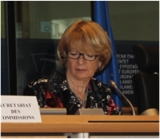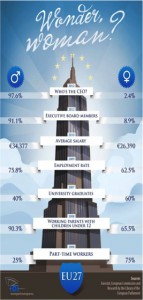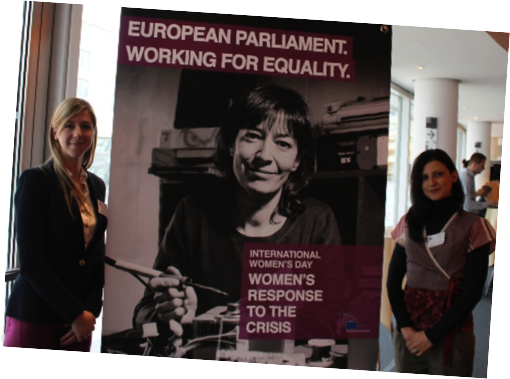On the occasion of the International Women’s Day 2013, EPN was glad to attend the Interparliamentary Committee Meeting held at the European Parliament and entitled “Women’s Response to the Crisis”. For the occasion, Members of the European Parliament and their national counterparts had the opportunity to share their views about the effects of the crisis on gender equality and the situation of women. Panel discussion focused on best practices from women-professionals, experiences from national parliaments and EU support towards Member States in strengthening women’s social and economic rights in the crisis.
What was mainly stressed during the meeting was that the European Union is addressing a great economic and financial crisis from which unemployment rates in the Member States have risen significantly as a result of it. The effects of this crisis are particularly serious for women who are affected directly – through loss of their jobs or job security – and indirectly via budget cuts in public services and welfare assistance. In fact, it was stated that women are now becoming the main victims of austerity measures. Budget cuts by governments implementing austerity plans are affecting the public sector which is mainly staffed in by women who represent approximately 70 % of the sector’s employees!
Moreover, unemployed women are often not included in official figures because they tend to withdraw from the labour market and to perform unpaid or informal work. Member States need to take seriously into consideration alternative measures in order not to fall back on what we have achieved so far. “The International Women Day is indeed an occasion to insist on the positive role played by women in Europe’s economy and on the whole of society”, underlined Mariya Gabriel, the EPP Group’s Spokeswoman on women’s rights and gender equality. “As a matter of fact, the European Union cannot afford to do without the managerial skills of half of its population. We must give more value to the way women are managing companies in these times of economic and financial crisis because their qualities are essential assets for companies and for the economy! Proof of this is that SMEs led by women are 10 to 20% more profitable than the average same-sized companies. Their turnover is 50% higher than the average (numbers from Women Equity Growth Index 2012)”.
Among the speakers, we wish to recall Sasha Bezuhanova, Director for Public Sector Growth Markets in HP and Chairperson of the Bulgarian Center of Women in Technologies. Her intervention was inspiring and rather realistic. She underlined that today the BRICs countries are the ones mastering the economic agenda in the world and the EU should be proactive in securing the technological dimension by making it accessible to everybody, above all women. If we can endow our market with more people handling technology and with a good accountability system, we could also let employees choose to work from home and women would benefit greatly from it. She gives the example of HP – her company – where 80% of employees can choose to work from home.
Similarly, EPN very much appreciated the intervention of Sylvia Walby, Distinguished Professor of  Sociology at Lancaster University and UNESCO Chair in Gender Research since 2008. Her current research interests revolve around gender and violence as well as gender and the crisis, moving between theory, measurement and policy impact.
Sociology at Lancaster University and UNESCO Chair in Gender Research since 2008. Her current research interests revolve around gender and violence as well as gender and the crisis, moving between theory, measurement and policy impact.
In response to the question of how the EU should tackle the social exposure that women are experiencing after the austerity cuts – above all in the health and educations sectors – she gave us her insight by resuming the two approaches that the supranational and national institutions should be able to balance: “Either we address the issue of gender equality because of its own rights and because it is good for everything else through directives and treaties, or we turn to the rights and the representation matter through affirmative action’s such as quotas. >>. About quotas, the general opinion agreed on the fact that we need them to cope with a certain mentality and show that we have capable women. In this sense, Sweden, Spain and Ireland are good examples. She also brought to the surface the issue of the ageing population, which is deeply related to the issue of life-long learning and the constant need of gaining new skills during the path of life.
During the second panel, we could assist the interventions by some Members of the National Parliaments. 
Carmen Quintanilla, Member of the Parliament of Ciudad Real and Chairwomen of the Equality Committee in the Congress of Deputies in Spain stepped up and described the situation of women in Spain. She spoke about the ongoing reform process in Spain and the big fallback of the crisis represented by the high unemployment rate, above all in the building sector. Many women were hit hard by job losses and are more at risk of poverty then men. To get by this situation, the Spanish government is trying to support the creation of jobs for women aged under 25 and further subside the unemployed people. However, to her eyes a lot has to be done and the Member States need to cooperate more and exchange good practices, especially in the fields of violence against women, conciliation between family and work life and the gender pay gap.
We could also hear from Roland Courteau, Vice-Chair of the Delegation for Women’s Rights and Gender Equality within the French Senate. He highlighted that to advance commitments in regard to gender equality and empowerment of women, we need to identify discriminatory attitudes and tackle gender stereotypes as a persistent and cross-cutting issue. He called for effective policy responses including in the area of education and media. He also stated that it is regrettable that the EU has got such a high rate of women in the sector where the jobs are unstable and underpaid. The French government intends to struggle the rising number of unemployed women by encouraging part-time jobs for women at every age.
The third and final panel was formed by Elisabeth Morin-Chartier, Vice-Chair of FEMM Committee at the European Parliament and László Andor, Commissioner for Employment, Social Affairs and Inclusion, who prepared an inspiring video message for the occasion.
Elisabeth Morin-Chartier, MEP and EP Rapporteur on the “Impact of the economic crisis on Gender  Equality and women’s Rights”, said: “Women are confronted with a silent and pernicious crisis which aggravates and weakens their situation. Before the economic and financial crisis, unemployment, precarious work, part-time work, low salaries and slow career paths already affected women more than men. Today, with the effects of austerity policies, they are suffering a double punishment. The risk of falling into poverty has increased for them”, she explained.
Equality and women’s Rights”, said: “Women are confronted with a silent and pernicious crisis which aggravates and weakens their situation. Before the economic and financial crisis, unemployment, precarious work, part-time work, low salaries and slow career paths already affected women more than men. Today, with the effects of austerity policies, they are suffering a double punishment. The risk of falling into poverty has increased for them”, she explained.
“We must continue to fight vigorously against all stereotypes in women’s work, such as the idea that women’s unemployment is less dramatic than men’s. What’s more, the fact that for equal work and competence, a gender pay gap of 16.2% still exists. This means women need to work 59 days more to achieve the annual pay of men which is an absolute scandal in a 21st century Europe”, continued Morin-Chartier. “When economic recovery takes off, qualified staff will be greatly needed. Young women, who on average are better educated than men as 60% of university graduates are women, are a great pool of competences. They will be our best arms for the competitiveness of our companies, who would be well advised not to do without them”. She concluded by saying that “16.2% gender pay gap is intolerable!”.
 László Andor’s inspiring video message for the occasion:Women’s day is a day for reflecting on how far we have got in terms of gender equality. Gender equality is not only a fundamental right, but also vital to the growth, prosperity and competitiveness of Europe’s economies. With the population growing older, birth rates falling and the prospect of skill shortages ahead, taking advantage of everyone’s talents and making gender diversity a growth asset is more important than ever. We cannot ignore the way in which the crisis has affected gender-equality. When the crisis first hit, the gender employment gap narrowed because the crisis mainly affected sectors like construction and car manufacturing where men were predominant. But since then, cuts in public sector employment and public spending appear to have had a significant adverse effect on the gender gap. This is due to some extent to the fact that women are over-represented in the public sector. They also tend to depend more on access to certain services, including childcare, long-term care and health care.
László Andor’s inspiring video message for the occasion:Women’s day is a day for reflecting on how far we have got in terms of gender equality. Gender equality is not only a fundamental right, but also vital to the growth, prosperity and competitiveness of Europe’s economies. With the population growing older, birth rates falling and the prospect of skill shortages ahead, taking advantage of everyone’s talents and making gender diversity a growth asset is more important than ever. We cannot ignore the way in which the crisis has affected gender-equality. When the crisis first hit, the gender employment gap narrowed because the crisis mainly affected sectors like construction and car manufacturing where men were predominant. But since then, cuts in public sector employment and public spending appear to have had a significant adverse effect on the gender gap. This is due to some extent to the fact that women are over-represented in the public sector. They also tend to depend more on access to certain services, including childcare, long-term care and health care.
Reaching the Europe 2020 Strategy targets for employment and poverty reduction should strengthen women’s social and economic rights. Yet the figures are disappointing. The female employment rate varies widely across the EU, but it is lower than that of males in all Member States. In 2011, the employment rate for men stood at 70.1 % in the EU-27, as compared with 58.5 % for women. What is more, one man in ten worked part-time on average, but the average for women was three in ten. Working part-time may be a choice, but it often goes hand in hand with lower hourly earnings, fewer training opportunities, less job security, and reduced pension entitlements. This can be put down partly to unpaid household, childcare and long-term care tasks. Women’s working conditions have moreover become more insecure and their income has dropped significantly. This is due to the persistent gap between salaries for men and women and the resulting lack of equality in unemployment benefit, and the rise in imposed part-time working and in the number of temporary or fixed term jobs.
Another major factor is skills. Although women are doing better than men in almost all disciplines throughout the OECD countries, the numbers of female graduates in science, technology, engineering and mathematics are still low. And the women who do graduate in these fields, where labour market demand is high, often choose not to work in them. By combating gender stereotypes in early schooling, education and training systems and providing more apprenticeships for young women in businesses, more women could be encouraged to study these disciplines and to pursue a career in these fields. Temporary or part-time work, single-parent households, pay gaps and career breaks also help to explain why 12 million more women than men live in poverty in the EU.
 In a situation where welfare is among the first targets of budget cuts, we need to remember that social protection plays a vital role in preventing women from falling into poverty and in helping to lift them out of it. Moreover, social spending which leads to more gender equality should be seen as a social investment. This is one the messages we conveyed with the Social Investment Package adopted on 20th February. It recalls for instance that the transition from part-time to full-time working could be facilitated by the provision of available, affordable childcare and out-of school services.
In a situation where welfare is among the first targets of budget cuts, we need to remember that social protection plays a vital role in preventing women from falling into poverty and in helping to lift them out of it. Moreover, social spending which leads to more gender equality should be seen as a social investment. This is one the messages we conveyed with the Social Investment Package adopted on 20th February. It recalls for instance that the transition from part-time to full-time working could be facilitated by the provision of available, affordable childcare and out-of school services.
For its part, the Commission will continue to closely monitor the Member States’ progress on gender equality through the European Semester. During the last Semester nine Member States have received country- specific recommendations on gender equality or fostering a better work-life balance. Most concern the provision of adequate and affordable care services, while some concern better fiscal treatment of second-earners. Two Member States received recommendations on a high gender pay gaps.
It is also important to recall how the EU Structural Funds can be used to strengthen women’s social and economic rights. European Social Fund actions have a strong added value in terms of promoting gender equality in the Member States. And the Commission’s proposal for the next programming period offers major possibilities for reinforcing gender equality.
The goal of full gender equality may seem like a mirage that retreats before you as you advance towards it. But our future growth and prosperity will depend on how successful we are in harnessing the talents of all and women in particular.

